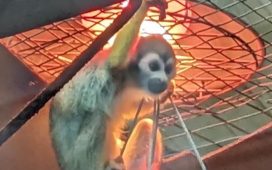It’s probably for the best that the BBC didn’t put out one of its landmark nature series during lockdown. I don’t think I’d have been able to take it. In times of trouble, the last thing anyone wants to see is a gory, operatic, kill-or-be-killed reminder that all life on Earth is locked in a hellish struggle for survival that, by design, they are guaranteed to lose. Yes, we’re fully aware that life is pain, thanks very much. Not now, Attenborough.
You sense that Netflix understands this, too, because that’s the only logical explanation for the existence of its new wildlife show Penguin Town. Penguin Town is about some penguins that live in a town. The penguins are real (they’re endangered African penguins), and the town is real (it’s Simon’s Town in South Africa). But apart from that everything is lovely and cuddly and anthropomorphised to high heaven.
These penguins don’t just have names, they have entire backstories. There are the Bougainvilleas, a pair of smug, married penguins who live in the suburbs and sometimes fall prey to social climbing. There’s Junior, a two-year-old troublemaker about to journey into manhood. There are a pair of newlyweds. Even the penguins’ predators are labelled as “The Bad Guys”.

The narration, too, is arguably the least awestruck voiceover you’ll ever hear on a wildlife show. Penguin Town is narrated by Patton Oswalt, who largely sticks to ellipses-filled one-liners. We see some penguins walk to the sea, and he quips “The beach is five blocks away … they’re getting their 10,000 steps in today!” We see some beautiful underwater footage of the penguins gorging on sardines, and he quips: “It’s like Weight Watchers … in reverse!”
So Penguin Town isn’t exactly an intellectual showcase. What it is, though, is tremendous comfort food. Jeopardy is in short supply here. There are seals, and we’re told that seals eat penguins, but we never see it happen. A seagull goes after a penguin egg, but the tension is quickly undone by the fortunate arrival of a golf ball. When something terrible does happen – when a penguin couple lose their eggs and split up, say – the sadness is quickly brushed away with the revelation that one of the eggs was rescued. Hooray! This seems to be the pattern; the cruelty of the world is sometimes hinted at, then spirited away without any trouble. Actual documentarians would probably be appalled, but this probably isn’t for them.
If you have children, you can reassure yourself with the knowledge that Penguin Town is perfectly safe to watch. This might not seem like much, but it is. Most parents I know have experiences where their kids suddenly express an interest in, say, antelopes. “I know where we can watch antelopes!” they exclaim, and bung on an Attenborough documentary, only to realise with a horrifying jolt that they’ve forgotten about the moment 45 seconds in where an alligator lunges out of nowhere and tears an antelope’s face clean off and David Attenborough sighs: “The antelope’s children are orphans now. Come the winter, they will all be brokenhearted and dead.”
There is none of this on Penguin Town. Are there shots of penguins walking around slowly in packs, like the protagonists during the opening credits of Reservoir Dogs? Yes. Is there a lot of plinky-plonky music? Yes. Is one of the characters called Mrs Wheelbarrow? Yes. But are we exposed to the raging savagery of the sort that the BBC’s Dynasties served up with its scene of penguins trapped and awaiting death in a frozen gully? Thankfully, not. After the year we’ve all had, Penguin Town will do nicely.














